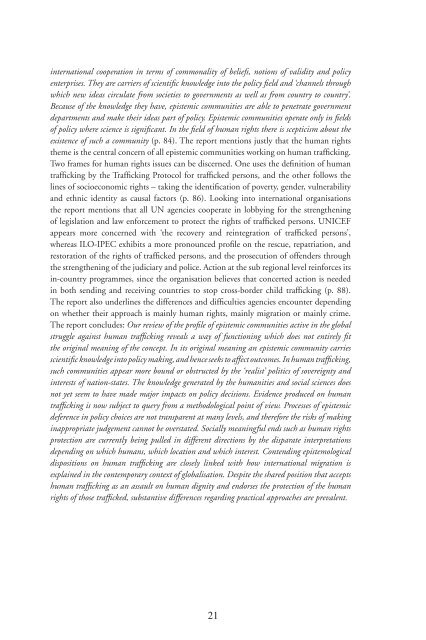Trafficking in human beings: human rights and ... - unesdoc - Unesco
Trafficking in human beings: human rights and ... - unesdoc - Unesco
Trafficking in human beings: human rights and ... - unesdoc - Unesco
Create successful ePaper yourself
Turn your PDF publications into a flip-book with our unique Google optimized e-Paper software.
<strong>in</strong>ternational cooperation <strong>in</strong> terms of commonality of beliefs, notions of validity <strong>and</strong> policy<br />
enterprises. They are carriers of scientifi c knowledge <strong>in</strong>to the policy fi eld <strong>and</strong> ‘channels through<br />
which new ideas circulate from societies to governments as well as from country to country’.<br />
Because of the knowledge they have, epistemic communities are able to penetrate government<br />
departments <strong>and</strong> make their ideas part of policy. Epistemic communities operate only <strong>in</strong> fi elds<br />
of policy where science is signifi cant. In the fi eld of <strong>human</strong> <strong>rights</strong> there is scepticism about the<br />
existence of such a community (p. 84). The report mentions justly that the <strong>human</strong> <strong>rights</strong><br />
theme is the central concern of all epistemic communities work<strong>in</strong>g on <strong>human</strong> traffi ck<strong>in</strong>g.<br />
Two frames for <strong>human</strong> <strong>rights</strong> issues can be discerned. One uses the defi nition of <strong>human</strong><br />
traffi ck<strong>in</strong>g by the Traffi ck<strong>in</strong>g Protocol for traffi cked persons, <strong>and</strong> the other follows the<br />
l<strong>in</strong>es of socioeconomic <strong>rights</strong> – tak<strong>in</strong>g the identifi cation of poverty, gender, vulnerability<br />
<strong>and</strong> ethnic identity as causal factors (p. 86). Look<strong>in</strong>g <strong>in</strong>to <strong>in</strong>ternational organisations<br />
the report mentions that all UN agencies cooperate <strong>in</strong> lobby<strong>in</strong>g for the strengthen<strong>in</strong>g<br />
of legislation <strong>and</strong> law enforcement to protect the <strong>rights</strong> of traffi cked persons. UNICEF<br />
appears more concerned with ‘the recovery <strong>and</strong> re<strong>in</strong>tegration of traffi cked persons’,<br />
whereas ILO-IPEC exhibits a more pronounced profi le on the rescue, repatriation, <strong>and</strong><br />
restoration of the <strong>rights</strong> of traffi cked persons, <strong>and</strong> the prosecution of offenders through<br />
the strengthen<strong>in</strong>g of the judiciary <strong>and</strong> police. Action at the sub regional level re<strong>in</strong>forces its<br />
<strong>in</strong>-country programmes, s<strong>in</strong>ce the organisation believes that concerted action is needed<br />
<strong>in</strong> both send<strong>in</strong>g <strong>and</strong> receiv<strong>in</strong>g countries to stop cross-border child traffi ck<strong>in</strong>g (p. 88).<br />
The report also underl<strong>in</strong>es the differences <strong>and</strong> diffi culties agencies encounter depend<strong>in</strong>g<br />
on whether their approach is ma<strong>in</strong>ly <strong>human</strong> <strong>rights</strong>, ma<strong>in</strong>ly migration or ma<strong>in</strong>ly crime.<br />
The report concludes: Our review of the profi le of epistemic communities active <strong>in</strong> the global<br />
struggle aga<strong>in</strong>st <strong>human</strong> traffi ck<strong>in</strong>g reveals a way of function<strong>in</strong>g which does not entirely fi t<br />
the orig<strong>in</strong>al mean<strong>in</strong>g of the concept. In its orig<strong>in</strong>al mean<strong>in</strong>g an epistemic community carries<br />
scientifi c knowledge <strong>in</strong>to policy mak<strong>in</strong>g, <strong>and</strong> hence seeks to affect outcomes. In <strong>human</strong> traffi ck<strong>in</strong>g,<br />
such communities appear more bound or obstructed by the ‘realist’ politics of sovereignty <strong>and</strong><br />
<strong>in</strong>terests of nation-states. The knowledge generated by the <strong>human</strong>ities <strong>and</strong> social sciences does<br />
not yet seem to have made major impacts on policy decisions. Evidence produced on <strong>human</strong><br />
traffi ck<strong>in</strong>g is now subject to query from a methodological po<strong>in</strong>t of view. Processes of epistemic<br />
deference <strong>in</strong> policy choices are not transparent at many levels, <strong>and</strong> therefore the risks of mak<strong>in</strong>g<br />
<strong>in</strong>appropriate judgement cannot be overstated. Socially mean<strong>in</strong>gful ends such as <strong>human</strong> <strong>rights</strong><br />
protection are currently be<strong>in</strong>g pulled <strong>in</strong> different directions by the disparate <strong>in</strong>terpretations<br />
depend<strong>in</strong>g on which <strong>human</strong>s, which location <strong>and</strong> which <strong>in</strong>terest. Contend<strong>in</strong>g epistemological<br />
dispositions on <strong>human</strong> traffi ck<strong>in</strong>g are closely l<strong>in</strong>ked with how <strong>in</strong>ternational migration is<br />
expla<strong>in</strong>ed <strong>in</strong> the contemporary context of globalisation. Despite the shared position that accepts<br />
<strong>human</strong> traffi ck<strong>in</strong>g as an assault on <strong>human</strong> dignity <strong>and</strong> endorses the protection of the <strong>human</strong><br />
<strong>rights</strong> of those traffi cked, substantive differences regard<strong>in</strong>g practical approaches are prevalent.<br />
21

















